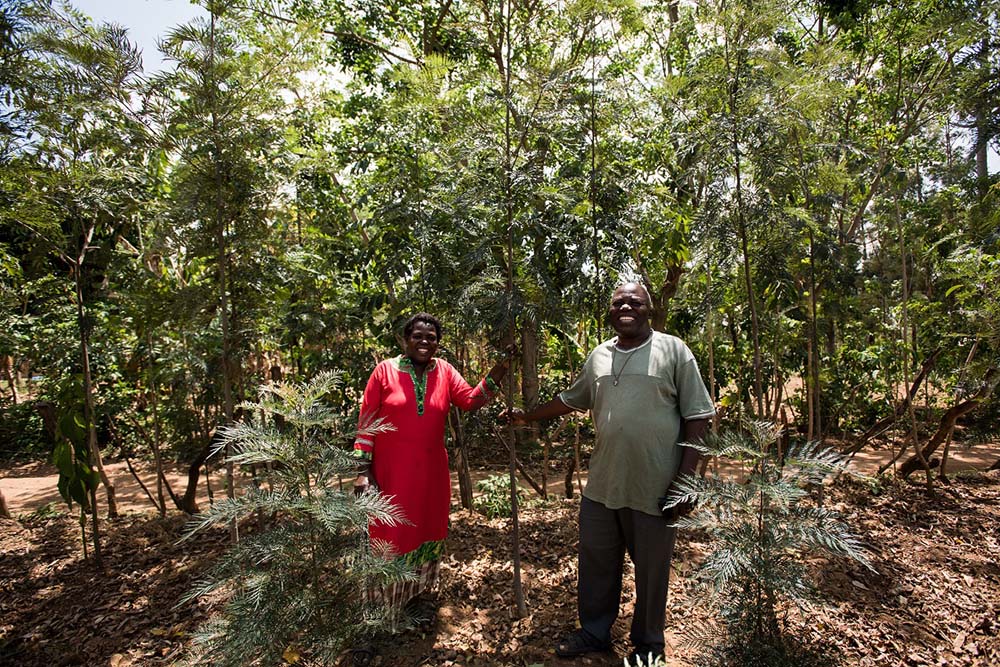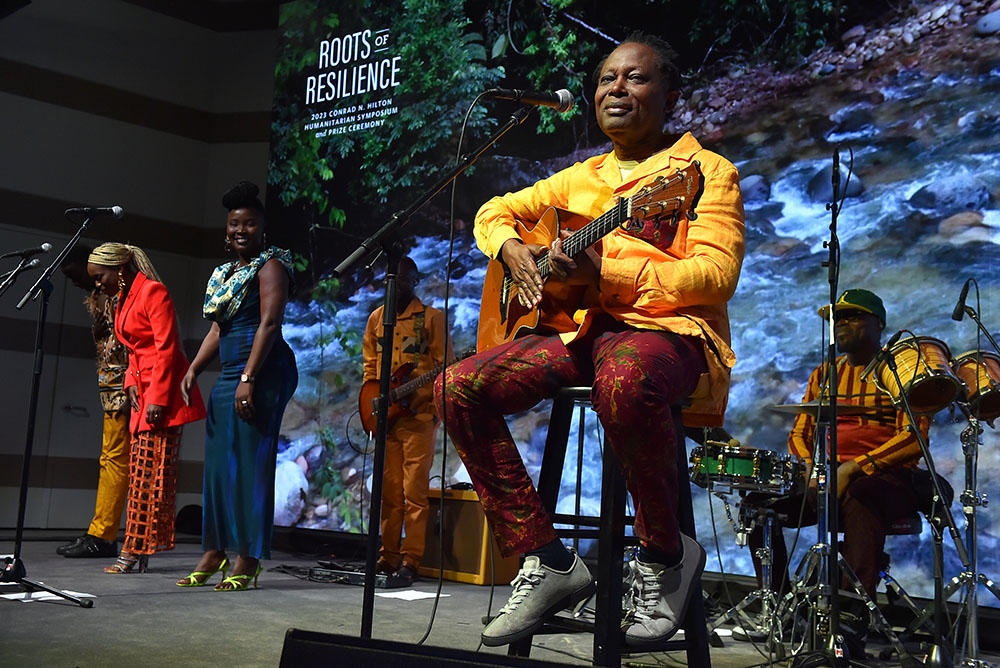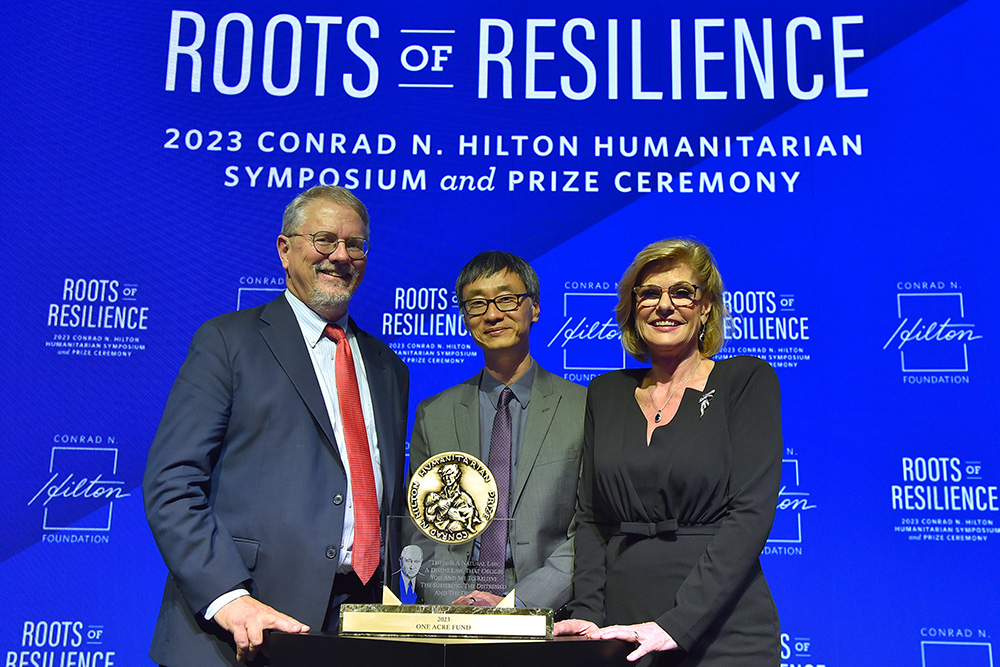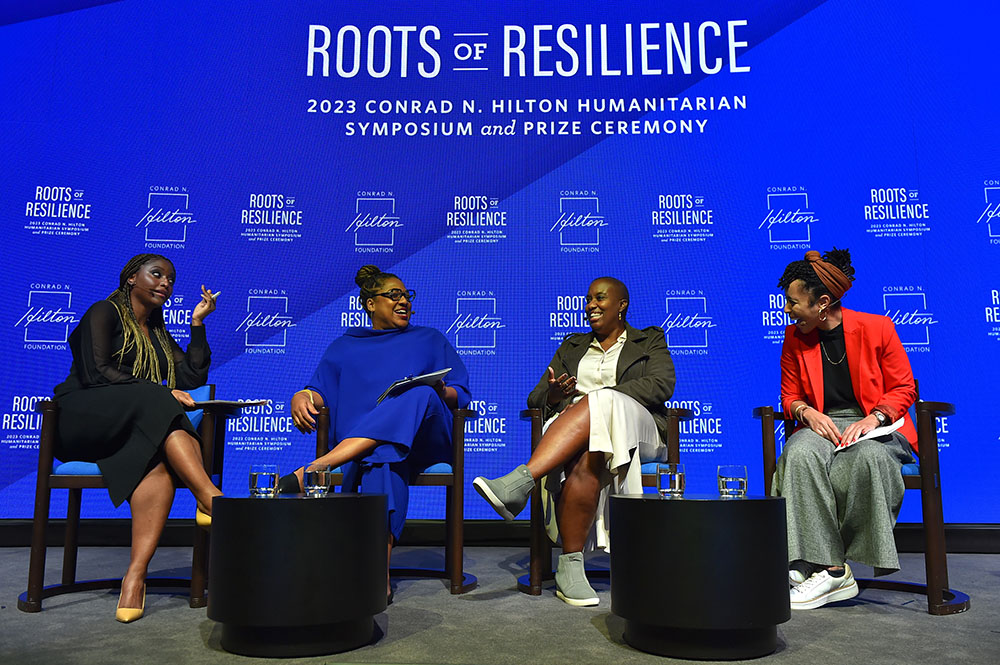
Davis Mukolwe, a small-holder farmer from Luucho, Kenya, has about 100 grevillea trees around his farm, all of them grown from seeds he received from One Acre Fund. The trees provide supplemental income for the family's 3-acre farm. (Newswire/Calvert Impact Capital/Courtesy of One Acre Fund and Hailey Tucker)
The centerpiece of the annual symposium and awarding of Conrad N. Hilton Humanitarian Prize on Oct. 26 was the traditional celebration of the Hilton Prize recipient — in this case, the One Acre Fund, a group supporting small-holder farmers in Africa.
But given the many and varied humanitarian crises facing the world today — including the Israel-Hamas war, the continuing conflict in Ukraine, recent earthquakes and floods, climate-related disasters and even the latest round of mass shootings in the United States — the all-day symposium and award ceremony also felt like a needed day of reprieve and reflection for the gathered humanitarian community.
And indeed, in kicking off the day's events with the theme "Roots of Resilience," Peter Laugharn, president and CEO of the Conrad N. Hilton Foundation, noted the numerous challenges facing the world, but also the many chances to serve humanity and heal the Earth.
Today, Laugharn said, "we have an opportunity to bring more light" into the world. He added, "We can share hope."

Congolese singer-songwriter Lokua Kanza and fellow musicians perform for attendees of the annual Conrad N. Hilton Humanitarian Symposium Oct. 26 at the Skirball Cultural Center in Los Angeles. (AP Images for Conrad N. Hilton Foundation/Jordan Strauss)
Hope is certainly a cornerstone of the work of the latest Hilton grantee. The Hilton Foundation, a major funder of Global Sisters Report, noted in an earlier announcement that the One Acre Fund "now reaches a network of four million farm families across nine countries through its direct service program and partnerships."
One Acre Fund, the Hilton Foundation said, provides "the financing, tools, and training to help farmers increase yields and profits, grow their way out of hunger, and create thriving economies. One Acre Fund's work is more critical than ever as Africa's vulnerable smallholder families bear the brunt of mounting global crises of food insecurity, poverty and climate change."
The context of that work is important: As the foundation noted in the earlier announcement, more than 50 million farm families with small plots of land in sub-Saharan Africa produce more than three-quarters of the continent's food supply and also rely on their farm production or outputs to earn a living.
"However, harvests from these farms continue to lag behind the rest of the world — while recent global economic volatility and climate concerns pose an existential threat to the livelihoods of these farmers," the announcement said.
In an interview, Presentation Sr. Joyce Meyer, Global Sisters Report sister liaison, Conrad N. Hilton Foundation board member and chair of this year's prize jury, said the selection of One Acre demonstrates the foundation's commitment to help grassroots efforts in tackling challenges around sustainable farming, hunger and climate change.
"We [society] talk about food. But where does food come from?" she said, adding that this year's prize is a recognition of the need to make visible an essential group in the world and in Africa. "Farmers are too often invisible," she said.
Advertisement
In a separate interview, Sr. Jane Wakahiu, a Little Sister of St. Francis of Kenya, and the Hilton Foundation's associate vice president of program operations and head of its Catholic Sisters Initiative, said the work of the One Acre Fund is similar in some ways to the ministry of Catholic sisters in Africa and globally, given a shared commitment to "helping people at the local level and moving people out of poverty in ways that are sustainable."
"It's important to help both families and communities to become independent so they can support themselves," Wakahiu told GSR.
The One Acre Fund, whose pilot projects began in 2006, now has a team of almost 10,000 staff serving 1.6 million farm families in nine African countries, as well as partnering that reaches another 2.5 million families. The organization says it will use the $2.5 million in unrestricted prize money to realize its goal of assisting some 10 million farmers "build pathways to prosperity by 2030."
At the same time, the Hilton funding will help "catalyze implementation of One Acre Fund's 10-year climate strategy, prioritizing adoptable climate-smart interventions that bolster farmers' incomes."
Among the highlights of these interventions will be to assist farmers to "improve their soil management, cultivate climate-resilient crops, and plant an estimated 74 million new trees across some of Africa's most degraded lands."
Andrew Youn, One Acre Fund's CEO and co-founder, told ceremony attendees that he was humbled to accept the prize on behalf of One Acre, saying the Hilton award "will help to elevate the voices of farmers in some of our world's major global conversations — especially climate change — and reinforces our core mission to improve the lives of smallholder farmers across sub-Saharan Africa."

The One Acre Fund, a group supporting small-holder farmers in Africa, is the 2023 recipient of the Conrad N. Hilton Humanitarian Prize, awarded Oct. 26 in Los Angeles. From left are Peter Laugharn, president and CEO of the Conrad N. Hilton Foundation; Andrew Youn, One Acre Fund's CEO and co-founder; and Linda Hilton, vice chair of the board of the Conrad N. Hilton Foundation. (AP Images for Conrad N. Hilton Foundation/Jordan Strauss)
He noted that most "of the world's $1-a-day poor have one profession, they are some of the hardest-working, powerful people on Earth, and they have a food-production machine — their farm — in their backyard."
He said that when small-holder farmers "become more productive, magic happens."
Youn added that "farming is the profession that is most affected by climate change."
When weather changes for farmers, he said, "it causes massive yield loss — and in Africa, climate change is already responsible for an estimated 68% of yield loss compared to other developing regions."
"This is not only gloom-and-doom though — this is a story that could actually have a good ending," Youn said. "There are many practical, scalable solutions that are a win-win-win for farmers — helping small-holder farmers earn more income, helping them to adapt their agriculture to changing weather, and sometimes even helping them contribute to humanity's climate mitigation fight."
What are possible solutions? Youn said, "Sophisticated weather and soil moisture data can help farmers to choose the optimal date to plant their seeds, which increases their harvests, helps them adapt their planting to their specific microclimate every year, and avoids unnecessary wastage of farm inputs."
Youn also noted that farmers can plant more trees, as "trees provide sustainable wood assets for farmers, saving income and the need to cut down forests. $1 given to a tree-planting program for a farmer generates more than $10 worth of sustainable wood assets for that farmer."
Trees are also resilient to changes in weather like droughts, helping farmers better adapt to changes in climate, he said.

A panel at the annual Conrad N. Hilton Humanitarian Symposium Oct. 26 discusses the global impact of Black feminist movements as catalysts of change. Participants were, from left, Isha Sesay, moderator; Amoretta Morris of Borealis Philanthropy; Janis Rosheuvel of Solidaire Network; and Tynesha McHarris of the Black Feminist Fund. (AP Images for Conrad N. Hilton Foundation/Jordan Strauss)
That kind of determined and grounded hopefulness was present throughout the symposium day, and not only during the prize ceremony, held at Los Angeles' Skirball Cultural Center.
During panel discussions, musical presentations and even poetry readings, participants stressed the need for humanitarian responses grounded in idealism but also practical methodologies — though participants also said the challenges of today require fresh, innovative and even big thinking.
One of the panels focused on the global impact of Black feminist movements and their potential to further needed social change.
Three panelists and moderator Isha Sesay, a journalist, media executive and author, all spoke of the need for philanthropy to support the work of Black women.
"To fund Black life is to fund Black joy," Sesay said.
Tynesha McHarris, co-founder of the philanthropic group Black Feminist Fund, added that deep and lasting change in the world requires the recognition of and participation of "Black feminist leadership, especially in the Global South."





